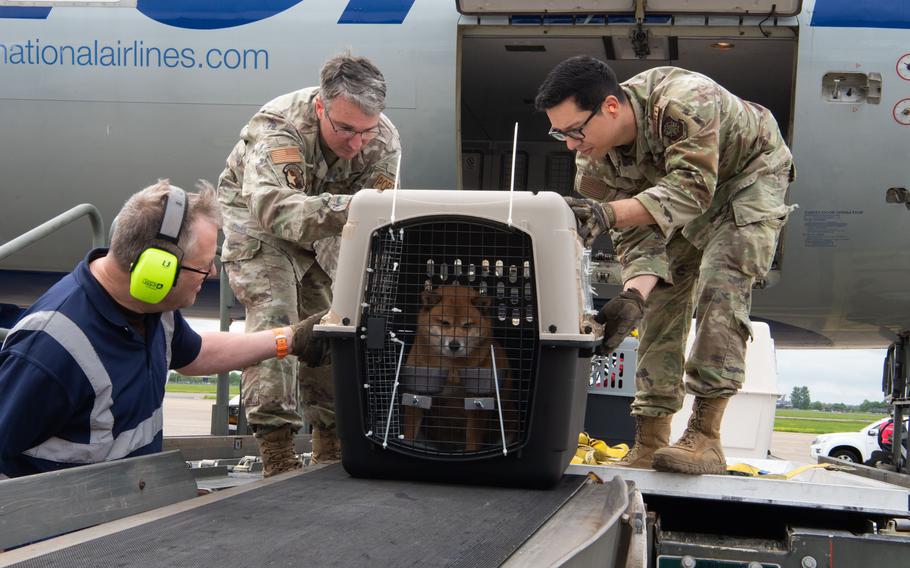
Air Force Tech. Sgt. Nicholas Lande and Senior Airman Michael Omana unload pets from the Patriot Express at Royal Air Force Mildenhall, England, in May 2023. (Anthony Hetlage/U.S. Air Force)
The U.S. Center for Disease Control and Prevention is setting new rules for dogs coming into the United States to prevent the spread of rabies.
Dogs in military families or that belong to Defense Department civilians are not exempt, CDC spokesman Dave Daigle told Stars and Stripes via email Tuesday. However, military veterinarians are qualified to get eligible canines ready and to issue the necessary paperwork, according to the CDC.
According to the new regulations, the dog must be healthy upon arrival, at least 6 months of age and microchipped. They must be vaccinated and have the necessary veterinary documents, along with a CDC Dog Import Form receipt, according to the CDC’s website.
The cost to microchip a dog ranges from $25 to $60 depending on the device and veterinarian, according to Pawlicy, a pet insurance market place. Dog vaccinations typically cost between $20 and $50 each; the rabies vaccine costs $23 to $27. The CDC import form is free.
“The CDC is updating its dog regulation to protect the health and safety of people and animals and prevent the re-introduction of dog rabies to the United States,” Daigle said.
Dog rabies was eliminated in the United States in 2007, but unvaccinated canines can still contract the disease from rabid wildlife such as raccoons, skunks or bats, he said.
These rules apply to dogs that left the U.S. and are returning regardless of the country they are coming from.
“This update keeps Americans and their pets safe and will address recent challenges seen with international dog importations, including the challenges posed by fraudulent documentation and dogs housed in unsafe conditions,” Daigle said. “The rule will also more closely align with the World Organization for Animal Health’s standards for the international movement of dogs from rabies-endemic countries.”
The 100-year-old organization, headquartered in Paris, coordinates, supports and promotes animal disease control with the objective of controlling animal diseases and preventing their spread, according to its website.
“If you don’t follow CDC’s rules, your dog won’t be allowed to enter the United States,” the CDC states on its website. “If denied entry, your dog will be sent back to the last country of departure at your expense. Country of departure is where the last trip originated — not where the dog was born or where it lives.”
A CDC “DogBot” on its website will help travelers determine what their dogs require to meet the new regulations.
DOD veterinarians are accredited by the Department of Agriculture and can access the Veterinary Export Health Certification System for the rabies vaccine form that dogs will need to enter the U.S., Daigle said. The DOD also supplies vaccines licensed by the Agriculture Department to U.S. military bases overseas.
Air Mobility Command, which provides air transportation for service members and their families making permanent changes of station, has posted information about the new CDC requirements on its travel website, command spokeswoman Tiffany Ormerod told Stars and Stripes via email Wednesday.
The information is visible by clicking on the “New CDC U.S. Pet Entry Requirements for Dogs” banner.
“All personnel stationed overseas and scheduled to PCS back to the United States after 1 August should review the CDC requirements and be prepared to demonstrate compliance when checking in for the Patriot Express flight,” Ormerod said.
The Patriot Express is a contracted air transportation service that flies regularly between the U.S. and overseas military installations.